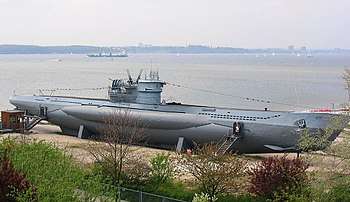German submarine U-1005
German submarine U-1005 was a Type VIIC/41 U-boat of Nazi Germany's Kriegsmarine during World War II.
 U-995 Type VIIC/41 at the Laboe Naval Memorial. This U-boat is almost identical to U-1005. | |
| History | |
|---|---|
| Name: | U-1005 |
| Ordered: | 14 October 1941 |
| Builder: | Blohm & Voss, Hamburg |
| Yard number: | 205 |
| Laid down: | 29 January 1943 |
| Launched: | 17 November 1943 |
| Commissioned: | 30 December 1943 |
| Fate: | Surrendered,14 May 1945 |
| Status: | Foundered under tow, 5 December 1945 |
| General characteristics | |
| Type: | Type VIIC/41 submarine |
| Displacement: |
|
| Length: |
|
| Beam: |
|
| Height: | 9.60 m (31 ft 6 in) |
| Draught: | 4.74 m (15 ft 7 in) |
| Installed power: |
|
| Propulsion: |
|
| Speed: |
|
| Range: | |
| Test depth: |
|
| Complement: | 44-52 officers & ratings |
| Armament: |
|
| Service record | |
| Part of: |
|
| Commanders: | |
| Operations: | 2 patrols |
| Victories: | None |
She was ordered on 14 October 1941, and was laid down on 29 January 1943, at Blohm & Voss, Hamburg, as yard number 205. She was launched on 17 November 1943, and commissioned under the command of Oberleutnant zur See Joachim Methner on 30 December 1943.[3]
Design
German Type VIIC/41 submarines were preceded by the heavier Type VIIC submarines. U-1005 had a displacement of 769 tonnes (757 long tons) when at the surface and 871 tonnes (857 long tons) while submerged. She had a total length of 67.10 m (220 ft 2 in), a pressure hull length of 50.50 m (165 ft 8 in), an overall beam of 6.20 m (20 ft 4 in), a height of 9.60 m (31 ft 6 in), and a draught of 4.74 m (15 ft 7 in). The submarine was powered by two Germaniawerft F46 four-stroke, six-cylinder supercharged diesel engines producing a total of 2,800 to 3,200 metric horsepower (2,060 to 2,350 kW; 2,760 to 3,160 shp) for use while surfaced, two BBC GG UB 720/8 double-acting electric motors producing a total of 750 metric horsepower (550 kW; 740 shp) for use while submerged. She had two shafts and two 1.23 m (4 ft) propellers. The boat was capable of operating at depths of up to 230 metres (750 ft).[4]
The submarine had a maximum surface speed of 17.7 knots (32.8 km/h; 20.4 mph) and a maximum submerged speed of 7.6 knots (14.1 km/h; 8.7 mph). When submerged, the boat could operate for 80 nautical miles (150 km; 92 mi) at 4 knots (7.4 km/h; 4.6 mph); when surfaced, she could travel 8,500 nautical miles (15,700 km; 9,800 mi) at 10 knots (19 km/h; 12 mph). U-1005 was fitted with five 53.3 cm (21 in) torpedo tubes (four fitted at the bow and one at the stern), fourteen torpedoes or 26 TMA or TMB Naval mines, one 8.8 cm (3.46 in) SK C/35 naval gun, (220 rounds), one 3.7 cm (1.5 in) Flak M42 and two 2 cm (0.79 in) C/30 anti-aircraft guns. The boat had a complement of between forty-four and fifty-two.[4]
Service history
U-1005 participated in two war patrol which resulted in no ships damaged or sunk.[3]
U-1005 had Schnorchel underwater-breathing apparatus fitted out sometime before February 1945.[3]
On 14 May 1945, U-1005 surrendered at Bergen, Norway and was transferred to Loch Ryan, Scotland on 2 June 1945, where she would wait nearly six months for her final fate. Of the 156 U-boats that eventually surrendered to the Allied forces at the end of the war, U-1005 was one of 116 selected to take part in Operation Deadlight. U-1005 was towed out but foundered on 5 December 1945, becoming one of the 56 U-boats that sank before reaching the scuttling areas.[3]
The wreck now lies at 55°33′N 8°27′W.[3]
See also
References
- Helgason, Guðmundur. "Joachim Methner". German U-boats of WWII - uboat.net. Retrieved 19 March 2016.
- Helgason, Guðmundur. "Hermann Lauth". German U-boats of WWII - uboat.net. Retrieved 19 March 2016.
- Helgason, Guðmundur. "U-1005". German U-boats of WWII - uboat.net. Retrieved 19 March 2016.
- Gröner 1991, pp. 43-44.
Bibliography
- Busch, Rainer; Röll, Hans-Joachim (1999). German U-boat commanders of World War II : a biographical dictionary. Translated by Brooks, Geoffrey. London, Annapolis, Md: Greenhill Books, Naval Institute Press. ISBN 1-55750-186-6.CS1 maint: ref=harv (link)
- Busch, Rainer; Röll, Hans-Joachim (1999). Deutsche U-Boot-Verluste von September 1939 bis Mai 1945 [German U-boat losses from September 1939 to May 1945]. Der U-Boot-Krieg (in German). IV. Hamburg, Berlin, Bonn: Mittler. ISBN 3-8132-0514-2.
- Gröner, Erich; Jung, Dieter; Maass, Martin (1991). U-boats and Mine Warfare Vessels. German Warships 1815–1945. 2. Translated by Thomas, Keith; Magowan, Rachel. London: Conway Maritime Press. ISBN 0-85177-593-4.
External links
- Helgason, Guðmundur. "Patrols by U-1005". German U-boats of WWII - uboat.net.